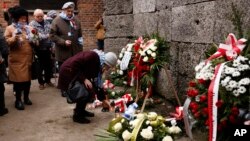The United Nations held a solemn ceremony Friday to mark the International Day of Commemoration in memory of the 6 million Jews killed in the Holocaust, plus the Roma, disabled people and countless others who died at the hands of Nazi Germany.
It began with a lullaby composed by Gideon Klein, who perished in a Nazi concentration camp. Klein’s music was followed by a solemn ceremony in which six candles were lit in memory of the 6 million victims of the Holocaust.
The event also paid tribute to those who liberated the Auschwitz-Birkenau death camp in Poland 78 years ago on January 27, 1945.
U.N. Secretary-General Antonio Guterres spoke in honor of the millions whose lives were cut short, their futures taken away.
He said the Holocaust was not inevitable but was the culmination of a millennia of antisemitic hate.
“The Nazis could only move with calculated cruelty from the discrimination of Europe’s Jews to their annihilation because so few stood up, and so many stood by,” Guterres said. “It was the deafening silence, both at home and abroad, that emboldened them. … Today and every day, let us resolve to never again remain silent in the face of evil.”
The Israeli ambassador to the United Nations in Geneva, Meirav Eilon Shahar, said antisemitism did not start with the Nazis and did not end with the liberation of the camps in 1945. She said anti-Jewish sentiment is still alive and spreading.
“We must double down on our fight against antisemitism,” she said. “We must fight against indifference and never forget our responsibilities. It is also why preserving the memory of the Holocaust and why remembering it is more important than ever.”
Holocaust survivor Avraham Roet was born in the Netherlands in 1928. He has made it his mission to pass on his memories of life as a Jewish child under Nazi occupation to a younger generation.
He said he survived by becoming a so-called child of the hidden. He said he had to keep moving from one place to another so as not to get caught. He said every community had traitors who were on the lookout for Jewish children to turn over to the Nazis.
“Finally, I did wind up with very poor Dutch farmers in the south of Holland,” he said. “They were Catholic and there was a pastor in that village who gave them orders to hide children with the various farmers in that neighborhood.”
Roet spoke for nearly an hour, the words flowing out in a rush as if a dam were about to break, as if time were running out.
“I feel it is my plight,” he said. “I feel it as my obligation to ask you to remember and not to forget. My sisters, Holocaust victims — all of them before they died, they asked me please remember and do not forget.”
The ceremony ended with a song by a Jewish composer who died in Auschwitz. Pianist Amit Weiner dedicated the song to his grandfather, Israel Weiner, and to the memory of his family members who were murdered in the Holocaust.

